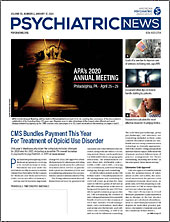Psychiatrists participating in the Medicare program are receiving a 1% overall increase in reimbursement this year under the 2020 Medicare Physician Fee Schedule released last November by the Centers for Medicare and Medicaid Services (CMS). It went into effect on January 1.
In what may be the most important change for 2020, CMS approved a bundled payment for physicians providing outpatient medication for addiction treatment (MAT) services to patients with opioid use disorders (OUDs) and is reimbursing physicians for care provided in opioid treatment centers (OTPs).
The Trump administration has reaffirmed that services for patients with opioid use and other substance use disorders, along with any other co-occurring mental illness, can be performed via telehealth without any geographic restrictions. The administration created three new telehealth codes—G2086, G2087, and G2088—covering care coordination, individual therapy, and group therapy and counseling.
A CMS fact sheet posted on the CMS website states: “A bundled payment for the management and counseling for OUD will create an avenue for clinicians to bill for a group of services in the office setting similar to the services being paid for under the new OTP benefit for opioid treatment program clinics. CMS is finalizing the creation of new coding and payment for a monthly bundle of services for the treatment of OUD that includes overall management, care coordination, individual and group psychotherapy, and substance use counseling, as well as an add-on code for additional counseling. The individual psychotherapy, group psychotherapy, and substance use counseling included in these codes could be furnished as Medicare telehealth services using communication technology as clinically appropriate. CMS will consider coding and payment amounts that recognize different levels of patient need and different types of practice arrangements for future rulemaking, including use of MAT in the emergency department setting.”
Esketamine Code Approved
CMS also approved reimbursement codes for administration of esketamine (G2082 and G2083), the intranasal medication for patients with treatment-resistant depression. At press time, APA was preparing a comment letter to CMS to ensure that the services are valued properly.
This year’s 1% increase in overall Medicare payments to psychiatrists is due to changes in the way practice expenses are calculated. (Reimbursement for individual psychiatrists will depend on individual practice patterns—the number of patients seen and the complexity of their illness.)
Medicare payments are calculated using the Resource-Based Relative Value Scale. They are determined by the resource costs needed to provide a service, with each service divided into three components: physician work, practice expense, and professional liability insurance. These variables are multiplied by a “conversion factor”—a monetary amount determined by CMS—and adjusted for geographical differences in resource costs.
Changes to Come in 2021
The 2020 fee schedule also includes changes to physician payment for outpatient evaluation and management (E/M) services scheduled to go into effect in 2021. These changes, along with other adjustments to psychiatrist payments, could result in a 7% increase in the overall payments to psychiatrists next year. However, APA staff cautioned that Medicare reimbursement is required to be “budget neutral”—meaning that gains for one medical specialty are offset by losses for another—and the 2021 changes are liable to be protested by specialties expected to get lower payments.
Also in 2021, psychiatrists will be able to bill Medicare for outpatient E/M services on the basis of time spent for any service they provide (except when also billing for a psychotherapy service). That is, billing by time for an E/M service is no longer limited, as it had been, to “counseling” (offering advice to the patient or family about an illness or condition) or “coordination of care” (communication with other clinicians or agencies regarding the nature of the patient’s condition and the needs of the patient and family).
Further, CMS will reduce the documentation requirements for E/M services: Psychiatrists billing for outpatient E/M services will be able to select and document the appropriate E/M code on the basis of time or medical decision making. This will simplify documentation in 2021, placing the emphasis on recording only those details relevant to the care provided on that date of service. APA plans to post educational materials on its website regarding this coding change.
APA CEO and Medical Director Saul Levin, M.D., M.P.A., said that APA has been heavily involved in advocating for the changes in E/M reimbursement and the resulting payment update for psychiatrists in 2021.
“This has included surveying our membership and submitting the data gleaned from that survey to the AMA’s Relative Value Scale Update Committee, which was instrumental in making the recommendation for increased reimbursement for evaluation and management services,” Levin said. ■
The 2020 Medicare Fee Schedule is posted in the Federal Register
here. A fact sheet about the fee schedule is posted
here.
